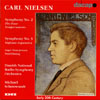Nielsen Symphonies Nos 2 & 5
The start of two Nielsen [symphony] symphonies series - one from Liverpool, the other from Copenhagen - using the new Danish critical edition of the works
View record and artist detailsRecord and Artist Details
Composer or Director: Carl Nielsen
Label: Da Capo
Magazine Review Date: 12/1999
Media Format: CD or Download
Media Runtime: 71
Mastering:
DDD
Catalogue Number: 8 224126

Tracks:
| Composition | Artist Credit |
|---|---|
| Symphony No. 2, '(The) Four Temperaments' |
Carl Nielsen, Composer
Carl Nielsen, Composer Danish National Radio Symphony Orchestra Michael Schønwandt, Conductor |
| Symphony No. 3, 'Sinfonia espansiva' |
Carl Nielsen, Composer
Carl Nielsen, Composer Danish National Radio Symphony Orchestra Inger Dam-Jensen, Soprano Michael Schønwandt, Conductor Poul Elming, Tenor |
Composer or Director: Carl Nielsen
Label: Classico
Magazine Review Date: 12/1999
Media Format: CD or Download
Media Runtime: 65
Mastering:
DDD
Catalogue Number: CLASSCD296

Tracks:
| Composition | Artist Credit |
|---|---|
| Symphony No. 2, '(The) Four Temperaments' |
Carl Nielsen, Composer
Carl Nielsen, Composer Douglas Bostock, Conductor Royal Liverpool Philharmonic Orchestra |
| Symphony No. 5 |
Carl Nielsen, Composer
Carl Nielsen, Composer Douglas Bostock, Conductor Royal Liverpool Philharmonic Orchestra |
Author: David Fanning
Drawbacks with the Liverpool recordings mainly concern the balance, which softens the impact of Nielsen's all-important side drum and timpani and also suggests a certain thinness in the strings. This undoes much of Bostock's excellent work with the pacing of the Fifth Symphony and sends you back to classic versions such as Bernstein's (using the revised version, of course) with renewed appreciation. Comparison with the new Danish performance of the Second Symphony is also striking, because Michael Schonwandt draws a weight of attack and a passionate eloquence from his strings such as I have simply never heard from a Danish orchestra before now, while the Dacapo recording has greatly superior depth and impact. This opens up possibilities for the dramatic profile of the work that are not even glimpsed by the Liverpudlians, while in the slow movement of the Espansiva even the rival San Francisco version, until now a clear top recommendation for this coupling, sounds bland by comparison.
In The four temperaments Bostock outpaces both Schonwandt and, by a whisker, Blomstedt - to quite superb effect in the choleric first movement. He also teases out many persuasive details, suggesting a careful study of the new edition, alongside a few moments which slightly smack to me of special pleading. Schonwandt scores high on detailed initiatives, too, and his less headlong approach yields its own rewards: he brings a wonderful galumphing recklessness to the central waltz of the Espansiva first movement, for instance. As to his slowish tempo for the main finale theme, I have more doubts. Maybe Nielsen's original pomposo marking, later suppressed, is the justification here, but at each appearance it necessitates shifts of gear which Blomstedt more effectively does without. Honours are even between the respective pairs of vocal soloists in the slow movement (word has it that when Bostock gets round to the Espansiva he will be offering in addition the first recording of the alternative instrumental version).
Without dislodging the above-listed recommendations then, each new issue has fascinating new insights and holds out excellent promise for future instalments.'
Discover the world's largest classical music catalogue with Presto Music.

Gramophone Digital Club
- Digital Edition
- Digital Archive
- Reviews Database
- Full website access
From £8.75 / month
Subscribe
Gramophone Full Club
- Print Edition
- Digital Edition
- Digital Archive
- Reviews Database
- Full website access
From £11.00 / month
Subscribe
If you are a library, university or other organisation that would be interested in an institutional subscription to Gramophone please click here for further information.




